Create Your Book
12 Create and Display Glossary Terms
Pressbooks allows you to create and display glossary terms throughout your book content and to display an automatically generated alphabetized list of all selected glossary terms in your book.
Create a New Glossary Term
There are two ways to create new glossary terms in Pressbooks. You can create terms directly from the Glossary Terms tool and then add them throughout the book, or you can create the terms directly from inside the content editor of your chapter, front matter, or back matter.
To create glossary terms through the Glossary Terms tool:
1 & 2: Click ‘Organize -> Glossary Terms‘ from the left sidebar menu of your book
- From the Glossary Terms menu, click the ‘Add New‘ button
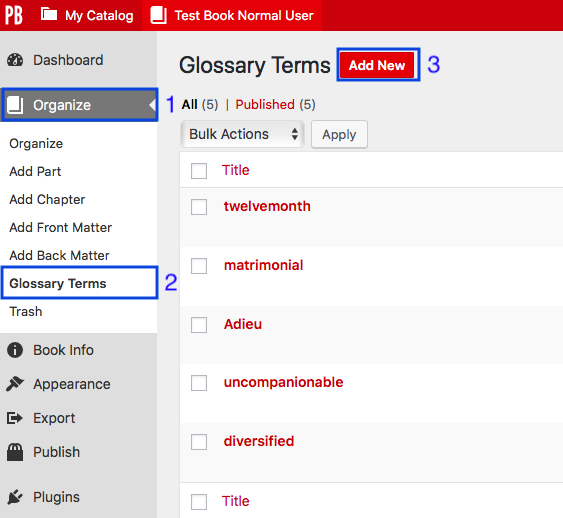
- Enter a title for your term
- Enter the relevant definition for your term
- Determine whether or not the term should “Show in Glossary List”
- Click Create

To create a glossary term directly from the content editor:
- Place your cursor where you’d like to insert a new term or select a word or phrase that you want to add a glossary term for
- Click GL on the Visual Editor toolbar to Insert a Glossary Term.

- The Glossary Terms interface will appear. In the Create and Insert Term tab, enter your desired Term (if you highlighted a word or phrase before clicking the Insert Glossary Term button, that word will automatically populate the Termfield)
- Add a relevant Description for the term
- Click ‘Insert’
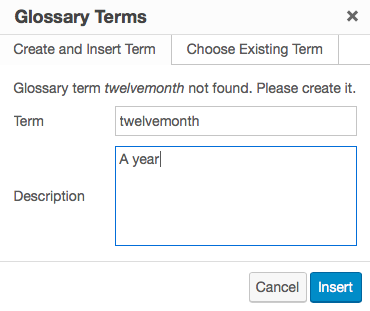
You will be returned to your content editor and will see the glossary term you created wrapped in a shortcode.

This shortcode is visible in the visual editor, but will be displayed as a functional tooltip in your webbook. Glossary terms are underlined with a dashed line in your Pressbooks webbook to visually distinguish them from normal hyperlinks. When a term is clicked, its definition will be displayed in an accessible tooltip.


Users can press the escape key on their keyboard to close the tooltip. The tooltip will also close if the user clicks anywhere else on the page outside of the glossary term.
Link to an Existing Term
You can also insert glossary links for existing terms. To do so:
- Highlight the word you are applying the existing glossary term, or place your cursor where you want the term to appear
- Click GL on the Visual Editor toolbar to open the Glossary Terms interface
- Select the Choose Existing Term tab
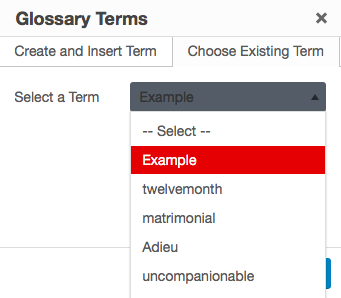
- Select the term from the dropdown menu (NOTE: If the text you’ve highlighted matches the name of an already existing term, the interface will automatically open to the Choose Existing Term tab with the matching term selected)
- Click Insert
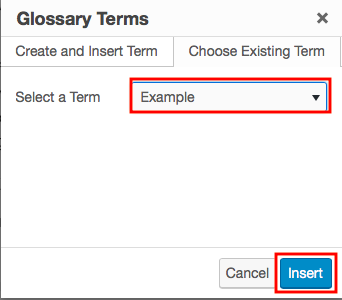
Create a Glossary List
A Glossary List will contain all listed glossary terms you’ve created for your book. Unless you exclude a term from the list by deselecting the ‘Show in Glossary Lists‘ option, all the glossary terms you create in your book will be included in your book’s Glossary List.
To generate the glossary list, follow these steps:
- Click Organize->Add Back Matter to create a new piece of back matter for your glossary terms.
- Add your desired title for your glossary
- Select ‘Glossary‘ from the Back Matter Type menu

- The following message will appear at the top of your screen: “To display a list of glossary terms, leave this back matter’s content blank.”

- Leave the content blank and click ‘Create‘
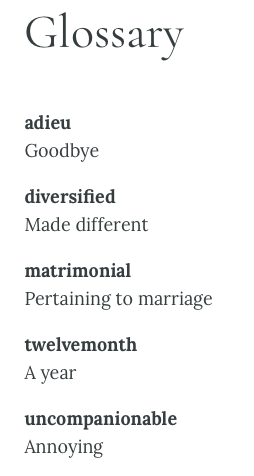 The glossary list will be generated and displayed in your webbook as well as your EPUB and PDF exports. The glossary list will present a consolidated, alphabetized list of all of the glossary terms which have been selected for display in the glossary list. The design of the glossary list is dependent on the theme and the book format. Glossary definitions can also be styled with links, bold, or italics with the Glossary Term visual editor toolbar. These styles will display in both the glossary list and the tooltip.
The glossary list will be generated and displayed in your webbook as well as your EPUB and PDF exports. The glossary list will present a consolidated, alphabetized list of all of the glossary terms which have been selected for display in the glossary list. The design of the glossary list is dependent on the theme and the book format. Glossary definitions can also be styled with links, bold, or italics with the Glossary Term visual editor toolbar. These styles will display in both the glossary list and the tooltip.

